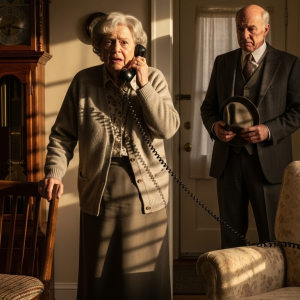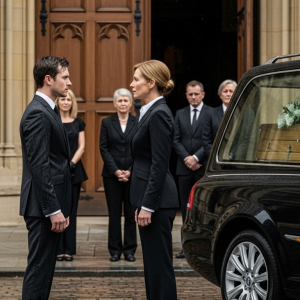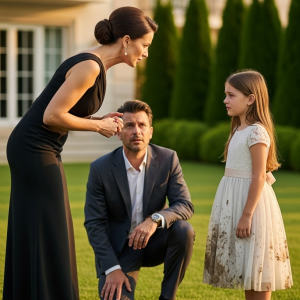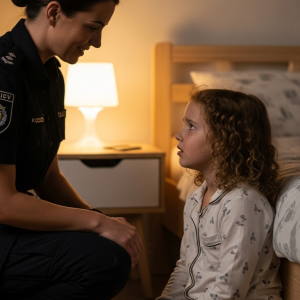Ashton Croft moved through life encased in a bubble of polished glass and cool, conditioned air. From the back seat of his chauffeured sedan, the city of Oakhaven was a silent film—a blur of muted colors and hurried figures he observed but never touched. At twenty-four, he was a young millionaire, the architect of a tech startup that had reshaped the digital landscape. He had a penthouse that scraped the clouds, a wardrobe of tailored suits, and a profound, gnawing loneliness he couldn’t name.
His world was one of sterile boardrooms, polite, meaningless conversations at charity galas, and an echoing silence in his vast, minimalist home. He had everything a person could want and felt connected to nothing at all. He often felt like a ghost haunting his own life, a spectator to his own success.
One crisp autumn afternoon, as his car paused at a bustling intersection, his gaze drifted to the sidewalk. And then he saw him. A boy, sitting on the grimy steps of a derelict building, his clothes little more than rags, his face smudged with dirt. But it wasn’t the poverty that made Ashton’s breath catch in his throat. It was the face.
It was his own.
The same golden-blonde hair, matted and filthy, but unmistakably the same shade. The same strong jawline, the same straight nose. And the eyes… they were the same deep, sapphire blue, staring out at the world with a weary hardness that Ashton had never known, but recognized on a primal, soul-deep level. It was like looking at a reflection in a shattered, dirt-streaked mirror—a ghost of a life he could have lived.
“Stop the car,” Ashton said, his voice a choked whisper.
His driver, a stoic man named Charles, glanced in the rearview mirror, confused. “Sir? We’re in a no-stopping zone.”
“I said, stop the car. Now.”
The urgency in his tone was undeniable. The car glided to a halt. Ashton opened the door, stepping out of his sanitized bubble into the raw, unfiltered air of the city street. The boy, seeing the expensive car and the man in the tailored suit approaching, immediately tensed. His body coiled like a cornered animal, ready to bolt.
“Hey,” Ashton said, his voice softer than he intended. “Don’t be afraid. I’m not going to hurt you.”
The boy didn’t speak. His blue eyes, so unnervingly familiar, were wide with suspicion and fear. He had learned long ago that men in expensive suits were not a source of comfort. They were a source of disdain, of orders to “move along,” of a casual cruelty that stung more than the cold.
“You… you look just like me,” Ashton stammered, the words feeling clumsy and inadequate. He took a slow step closer. The boy flinched and scrambled back a step.
“What do you want?” the boy finally asked, his voice rough and raspy, the voice of someone who used it more for shouting than for conversation.
“I just… I want to know your name,” Ashton said, trying to keep his tone gentle.
The boy hesitated, his eyes darting from Ashton’s face to the car, calculating his escape routes. After a long moment, he mumbled, “Luke.”
“I’m Ashton,” he said, offering a small, uncertain smile. He extended a clean, manicured hand. “It’s nice to meet you, Luke.”
Luke stared at the outstretched hand as if it were a foreign object. No one had offered to shake his hand before. People threw coins at his feet. They averted their eyes. They pretended he didn’t exist. But this man, this ghost-reflection of himself, was offering a gesture of respect. Hesitantly, Luke wiped his grimy hand on his torn trousers and reached out.
The moment their hands touched, a jolt, electric and undeniable, passed between them. It was a current of recognition, a silent, powerful acknowledgment that this was not a coincidence. This was fate.
“Luke,” Ashton said, his voice filled with a conviction that defied all logic. “I don’t know how, and I don’t know why, but I think you need to come with me.”
Bringing Luke home was like leading someone from a war-torn country into a palace. He walked across the plush, cream-colored carpets as if he expected them to swallow him whole. He stared at the floor-to-ceiling windows that offered a panoramic view of the city with a kind of dazed wonder. In the kitchen, when Ashton offered him a sandwich, Luke ate it with a frantic, desperate hunger that spoke of years of gnawing emptiness.
Ashton watched him, a surreal feeling washing over him. He saw himself in Luke’s every gesture—the way he tilted his head when he was thinking, the way his left eyebrow arched slightly when he was skeptical. It was a bizarre, fragmented reflection, showing him a life of hardship he had been spared by some cosmic lottery.
“Mom, are you home?” Ashton called out, his voice echoing in the grand, silent house.
His mother, Eleanor Croft, emerged from the library, a warm smile on her face. She was a graceful woman, her elegance a shield against a past sorrow that still lingered in her eyes. “Ashton, darling, I didn’t know you were back so—”
Her words died in her throat. Her eyes fell upon Luke, who stood frozen by the kitchen island, looking small and lost amidst the sterile luxury. The book in Eleanor’s hand slipped from her fingers, thudding softly onto the marble floor. Her face, which had been alight with a welcoming smile, drained of all color.
“No,” she whispered, her hand flying to her mouth. “It can’t be.”
Her knees gave way, and she crumpled to the ground, a single, gut-wrenching sob tearing from her chest. It was not a cry of surprise; it was a cry of recognition, of a long-buried guilt that had just clawed its way to the surface.
Ashton rushed to her side, his own confusion mounting. “Mom? What is it? What’s wrong?”
But Eleanor could only stare at Luke, her face awash with tears and a pain so profound it seemed to shatter the very air in the room. She reached out a trembling hand, not to Ashton, but to the ragged boy who stood watching, his fear now mixed with a dawning, impossible hope.
“I know,” she finally choked out, her words broken by sobs as she pulled Ashton into a desperate hug, her eyes still locked on Luke. “I’ve known you were out there. I’ve known for so long.”
The room was filled with a heavy, waiting silence. Ashton and Luke stared at each other, the same question blazing in their identical blue eyes. With a voice fractured by twenty-four years of grief and shame, Eleanor told them the story.
She and her husband, Ashton’s late father, hadn’t started with wealth. They had been young, deeply in love, and desperately poor, living in a cramped apartment on the wrong side of the city. When she became pregnant with twins, their joy was overshadowed by the terrifying reality of their circumstances. Her husband had a congenital heart condition, and the medical bills were crippling them. They had nothing.
“We made an impossible choice,” she wept, her words a torrent of confession. “My sister… she lived in another state. She was barren and had always longed for a child. She was a little better off than we were. We thought… we thought it was the only way for both of you to have a chance.”
She explained the desperate, secret pact. She had given one of her newborn sons—Luke—to her sister, with the tearful promise that when they were financially stable, they would reunite the family. It was meant to be a temporary, heartbreaking solution.
“But then she disappeared,” Eleanor whispered, her voice cracking. “A year later, we tried to contact her, but her phone was disconnected. The address was empty. She had moved without a word. We hired investigators, we searched for years… but it was like she had vanished from the face of the earth. We never knew if she had run away out of a selfish desire to keep you, or if something terrible had happened.”
The truth was a raw, gaping wound in the center of their pristine home. Luke was not just a doppelgänger. He was a brother, a son, a missing piece of their family’s secret history, lost for decades due to poverty, desperation, and a broken promise.
Ashton felt a warmth spread through his chest, a profound sense of connection that banished the loneliness he had carried for so long. He looked at Luke, no longer seeing the dirt or the rags, but seeing a blood relative, a part of himself that had been missing.
“Luke,” Ashton said, his voice thick with emotion. “Come home. For real this time. We’re brothers.”
Luke stared at him, his expression a turbulent mix of disbelief and a hope so fierce it was painful to behold. Life on the streets had taught him that hope was a dangerous thing. It was a mirage that promised water and delivered only sand.
But Ashton’s sincere gaze, his mother’s heartbroken confession, the undeniable, magnetic pull of looking at his own face—it was all too powerful to deny.
“Really?” Luke asked quietly, the single word carrying the weight of a lifetime of abandonment.
“Really,” Ashton said, his smile the first truly joyful one he had felt in years. “We’re brothers.”
The first few days were a delicate, awkward dance of discovery. Luke was given a luxurious guest suite, a room larger than any space he had ever inhabited. He slept for fourteen hours straight that first night, his body finally succumbing to years of exhaustion. When he woke, he found new clothes laid out for him, a warm meal waiting, and a silence that was more unnerving than the constant noise of the street.
Ashton and Luke began to tentatively circle each other, trying to bridge the twenty-four-year chasm that separated them. They discovered they had the same quirky habits—a shared love for spicy food, the same way of drumming their fingers when they were thinking. These small echoes of shared genetics were both comforting and jarring.
One afternoon, Ashton tried to show Luke the complex virtual reality system in his entertainment room. Luke watched, unimpressed, as Ashton navigated a digital world. “That’s neat,” Luke said, his tone flat. “But can it show you which street corners the cops don’t check after 2 a.m.?” The comment wasn’t meant to be sharp, but it hung in the air, a stark reminder of their different realities.
A few days later, some of Ashton’s wealthy friends came over for drinks. They were polite to Luke, but their questions were laced with a condescending curiosity. “So, what was it like? Living out there?” one of them asked, as if inquiring about an exotic vacation. Ashton saw the flicker of shame and anger in Luke’s eyes, and for the first time, he felt a hot, protective fury. He saw his friends for what they were: shallow, their concerns trivial, their empathy non-existent.
“He’s my brother,” Ashton said, his voice cold, cutting the conversation short. “That’s all you need to know.” After his friends left, a new, deeper understanding passed between the brothers. In that moment of shared indignation, they were truly a team.
Ashton and Eleanor quickly realized that healing Luke would require more than new clothes and regular meals. The street had left deep, invisible scars. Luke would hoard food from the dinner table, hiding rolls and fruit in his pockets, a habit born from never knowing where the next meal would come from. He would flinch at sudden movements or loud noises, his body conditioned to expect violence.
Eleanor’s path to earning his trust was the most painful. Her guilt was a palpable presence, and her attempts to mother him were often met with a recoiling suspicion. One evening, she reached out to gently brush a stray hair from his forehead. Luke flinched back so violently he almost fell off his chair. The look of raw hurt on her face was devastating.
“I’m sorry,” he mumbled, looking at the floor. “I’m not used to… that.”
She didn’t push. Instead, she started a new ritual. Every evening, she would make him a cup of hot chocolate, the way she had for Ashton when he was a boy. She would place it on the table beside him and simply sit in silence, not demanding conversation, just offering her quiet, constant presence. Slowly, tentatively, he began to talk. He told her small, fragmented stories of the street—of the bitter cold, of the rare moments of kindness from a stranger, of the constant, grinding fear.
She listened to every word, her heart breaking with each new revelation of the life her son had endured. This was her penance, not just to listen, but to truly hear, to bear witness to the pain her impossible choice had caused.
As Luke began to heal, a new, restless energy took hold of Ashton. It wasn’t enough to know what had happened. He needed to know why. What had become of his aunt, the woman who had taken his brother and then vanished?
“It’s not about revenge,” he explained to Luke and Eleanor one night. “It’s about answers. You deserve to know why she broke her promise, Luke. We all do.”
Using his considerable resources, Ashton hired a top private investigator. The trail was nearly twenty-five years old, cold and faint. They had a name—Eleanor’s sister, Clara—and a last known city. It was a long shot, but Ashton was relentless. The search gave the brothers a shared mission, a way to reclaim their family’s story together. They spent hours poring over old records and maps, tracing the ghost of a woman who held the final piece of their puzzle.
After weeks of searching, the investigator found her. Clara was living in a small, run-down apartment complex in a forgotten corner of Nevada. She was not a monster who had stolen a child out of malice. She was a broken, regretful woman, haunted by her own failures.
They flew out to meet her. The woman who opened the door was a frail, older version of their mother, her eyes holding the same deep-seated sadness. She told them her story in a quiet, halting voice. Her husband had left her shortly after she took Luke. She fell into a deep depression and lost her job. Drowning in poverty and shame, she couldn’t bring herself to return Luke to a family she felt she had failed. As things got worse, she could no longer care for him, and one desperate day, when he was just five years old, she had left him in the care of a local shelter, promising to return. She never did.
“I was a coward,” she wept, her body shaking with sobs. “I told myself it was for the best, that he’d be better off. But I knew it was a lie. I was just too ashamed to face your mother, to admit I had failed.”
The confrontation was quiet, painful, and devoid of anger. In that small, sad apartment, Luke finally received the answer he had been searching for. He hadn’t been thrown away because he was worthless. He had been a victim of a chain reaction of poverty and despair. He looked at the weeping woman, his aunt, and felt not hatred, but a profound, weary pity. He had survived. She, in many ways, had not.
They returned to Oakhaven with the final ghost of their past laid to rest. The mystery was solved, the wounds, while not gone, were finally able to begin scarring over. The focus shifted from understanding the past to building a future.
A year later, the Croft home was no longer a silent, sterile mansion. It was filled with the noise and warmth of a real family. Luke, no longer the timid boy, had enrolled in college, studying social work. He and Ashton had started a foundation to build shelters and provide resources for homeless youth, using their unique story as a catalyst for change.
One evening, Ashton found his mother and brother sitting together in the library, looking at an old photo album. Eleanor was pointing to a picture of two identical, swaddled infants. “You had your father’s nose,” she was saying to Luke, her voice soft and full of a peaceful, reclaimed love.
Luke looked up at Ashton and smiled. It was a genuine, easy smile, one that reached his deep blue eyes. In that moment, the lines between the millionaire and the beggar, the fortunate son and the lost boy, had completely disappeared. They were simply brothers.
Ashton knew their family was unconventional, forged in a crucible of poverty, secrets, and a one-in-a-billion chance. But as he watched his mother and brother, he realized that the strongest family bonds aren’t defined by a shared past, but by the love, support, and understanding you choose to build together in the present. He was no longer a ghost in his own life. He had found the missing piece of his soul on a city sidewalk, and in healing his brother, he had finally healed himself.




